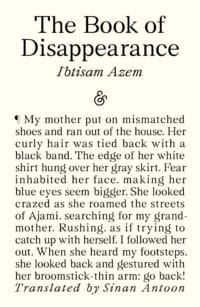Book review: The Book of Disappearance by Ibtisam Azem

Of the Palestinian books I’ve read in recent years, The Book of Disappearance by Ibtisam Azem is possibly the most educational, yet is also highly entertaining.
Alaa and Ariel are friends who live in the same building in Tel Aviv. They hang out most evenings, work in similar jobs and have friendly disagreements about the history of their city. But then one day Alaa disappears without warning – along with all the other Palestinians in Israel and the Occupied Territories. Ariel must now confront how well he knew his friend, and how he feels about Palestinians in general.
The narrative skips between Ariel’s story and excerpts from Alaa’s diary. In between are vignettes about how other non-Arab Israelis are affected by the disappearance of the Palestinians. From a farmer wondering why none of his day labourers have turned up, to a patient whose surgery is cancelled because the surgeon hasn’t come to work, at first the rumour is that “the Arabs” are on strike.
But how can four million people have just disappeared? Rumours swirl, security alerts are raised, official statements from the Knesset and IDF top brass are minimal.
There are some terms that switch depending on the speaker. Gaza and the West Bank versus Judea and Samaria. Jaffa city bordering Tel Aviv versus one big city called Tel Aviv-Yafo.
Alaa’s diary is addressed to his grandmother, who chose to stay in Jaffa, heavily pregnant, when all her family including her husband fled from war. They were all unable to return and she was trapped in a refugee camp in Jaffa for 10 years. Her story is a huge part of Alaa’s identity.
“Cities are stories and I only remember what I myself lived, or fragments from your stories and what you lived, but they are truncated. I remember their stories very well…I memorized their stories and their white dreams about this place so as to pass exams. But I carved my stories, yours, and those of others who are like us, inside me. We inherit memory the way we inherit the colour of our eyes and skin…Your memory pains me.”
At first it seems the only difference between Alaa and Ariel is their religions, and neither of them is devout anyway. But it gradually becomes clear that the divide between an Israeli Jew and a Palestinian living in Israel is always going to be wide. Ariel may be a liberal but he also wholeheartedly supports Israel and doesn’t understand his friend’s objections to the Hebrew street names in Jaffa.
“Ariel said that Iran was Israel’s major problem and…They should withdraw from the West Bank and Gaza and allow for the establishment of a demilitarized Palestinian state. Those seated around the table were aghast and looked at him as if he’d just arrived from outer space…How could Ariel, the son of an IDF hero, utter such words?…How could he call Judea and Samaria ‘the West Bank and Gaza’?…Spitting in their faces would be less offensive.”
I think this book is the first time I’ve encountered a character who advocates for a one-state solution and outlines what that would truly mean. He argues it would mean no dividing walls, no military checkpoints; freedom of movement, citizenship and voting rights for all. For me that short description really underlined why the current situation cannot be described as a single state of Israel.
This is a slim volume that packs in a lot through its use of multiple perspectives. There are some character opinions that are really unpleasant. And there is a growing sense of dread at what the official reaction is going to be when it finally comes.
This isn’t as tough a read as many Palestinian books I’ve tried. It still covers serious and tough issues, but with a lighter touch. I really enjoyed it.
Ibtisam Azem is a Palestinian writer living in New York. She was born and raised near Jaffa, attended university in Jerusalem then moved to Germany and later the US. She has written two novels in Arabic and has a short story collection out this summer, also in Arabic. The Book of Disappearance was nominated for the International Booker Prize 2025.
Translated from Arabic by Sinan Antoon.
First published in English in 2019 by the University of Syracuse Press. Published in the UK in 2025 by And Other Stories.